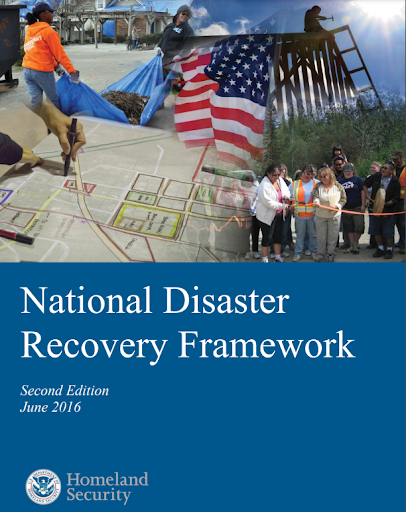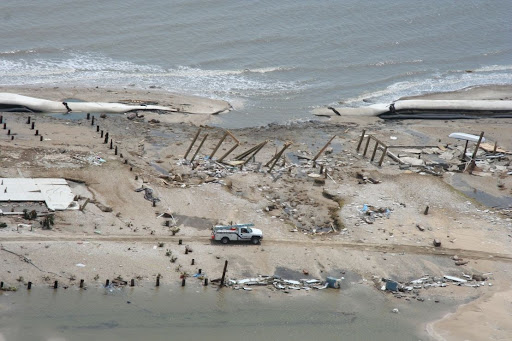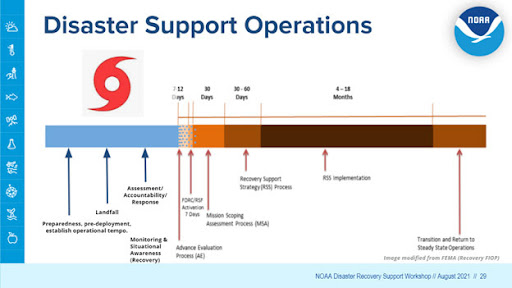Originally published on Oct. 14, 2021.
The Office of Response and Restoration’s Disaster Preparedness Program (DPP) and the University of New Hampshire’s Coastal Response Research Center (CRRC) recently hosted the first cross-NOAA workshop on Disaster Recovery Support.

The August 2021 virtual event brought together nearly 50 representatives from 10 programs across four line offices to learn, share, and discuss federal disaster recovery support and NOAA’s role. Planned by a steering committee composed of representatives from the National Ocean Service, National Marine Fisheries Service and Office of Oceanic and Atmospheric Research, the workshop was designed to address four key objectives:
- Increase understanding of the recovery support functions (RSFs) and NOAA’s role;
- Increase familiarity between the various NOAA offices and programs involved in disaster recovery support, along with their recovery-specific mission connections and resources;
- Identify key opportunities for future NOAA engagement in disaster recovery support provision; and
- Outline next steps to enhance internal recovery support coordination processes.
The two-day workshop featured a combination of presentations and interactive discussion sessions. OR&R Director Scott Lundgren and Office for Coastal Management Director Jeff Payne opened the first day with leadership perspectives on disaster recovery and resilience as part of NOAA’s science, service, and stewardship mission and the value of cross-NOAA collaboration to provide robust support to community needs across the disaster management cycle.
Following a “Recovery Support 101” session, national coordinators of two of the recovery support functions shared remarks via pre-recorded video on the mission of their respective RSFs, ways that NOAA expertise has helped to advance that mission in past recovery operations, and opportunities for collaboration in the future: National Coordinator of the Natural and Cultural Resources RSF Ryan Potosnak (Department of the Interior), and National Coordinator of the Economic RSF Naomi Friedman (Economic Development Administration).
Participants closed out the first day with a Jamboard-based sharing and discussion session on program missions and recovery connections, relevant resources and capabilities, potential collaboration areas, and potential gap areas for further exploration.
Mark Osler, National Ocean Service senior advisor for coastal inundation and resilience, opened the second day with insights on efforts across the federal interagency to tackle climate change and ensure equitable outcomes, as well as the vital role of expertise from across NOAA and partner networks in supporting the continuous drive toward improved community and national resilience.
Debbie Payton, former OR&R Emergency Response Division chief and a current Department of the Interior field coordinator for the natural and cultural resources RSF, shared experiences and lessons learned from ongoing hurricane recovery support operations in Puerto Rico. FEMA’s Matt Campbell, national coordinator of the community planning and capacity building RSF, followed via video with an overview of how this function supports communities before and after disaster, including examples of NOAA contributions to these efforts.

After an overview of the activities flow in disaster response and recovery operations by OR&R’s Charlie Henry and Autumn Lotze, attendees visualized where their office’s capabilities have and could potentially plug in through a Jamboard-based exercise. The timeline populated during the exercise served as a launching point for the workshop’s final session brainstorming areas for follow up action and ideas for next steps. Capacity building, internal coordination, training and information sharing were some of the highlighted areas.
Brainstorming from this inaugural workshop will inform development of a follow up event the Disaster Preparedness Program plans to host in 2022. The next workshop will dive more deeply into priorities identified by 2021 participants to help strengthen internal coordination, expand partnerships, and ultimately enhance connectivity between NOAA’s diverse resources and community and environmental needs in disaster recovery.

